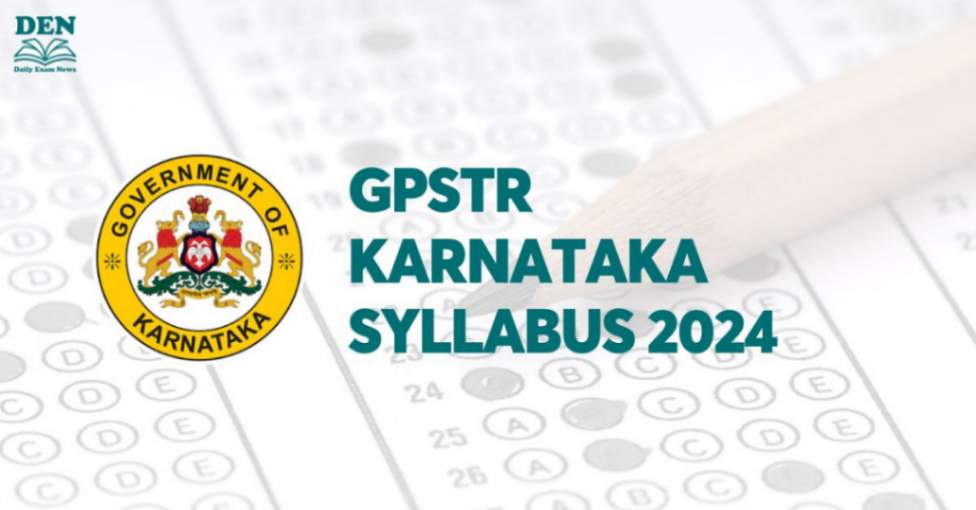The GPSTR Karnataka Syllabus 2024 has been made available to the aspirants for their preparation to appear for the written exam. The Graduate Primary School Teacher recruitment exam will cover a syllabus which will consist of a variety of subjects. This will be including Common Kannada Language, General Awareness, General Mental Aptitude, Educational Psychology, Value and Health Education. And there will be a Paper-2 which will test proficiency in the English Language, Social Studies, Mathematics, and Science etc. Paper-1 & Paper 2 both will comprise multiple-choice questions with a detailed marking scheme. However, Paper-2 will include both multiple-choice and descriptive questions. The exam pattern ensures that aspirants are well-prepared across all essential domains. Candidates must read the article carefully to know more about the GPSTR Karnataka syllabus.
GPSTR Karnataka Syllabus 2024
The GPSTR Karnataka Syllabus will comprise of subjects & covers a wide range of topics. This will include topics and sections from Grammar, quantitative and Reasoning ability, General Knowledge etc. You must gauge the topic wise details of each subject from the tables below.
| Paper | Subject | Topics Covered |
| Paper-1 | Common Kannada Language | Kannada Grammar, Vocabulary, Comprehension, Sentence Structure, Idioms, and Phrases |
| Language Test | Proficiency in Kannada Language, Reading and Writing Skills, Understanding of Grammar and Usage | |
| General Awareness | ||
| Books and Authors | Famous Books and Their Authors, Recent Publications | |
| Inventions & Discoveries | Important Scientific Discoveries, Notable Inventions and Innovations | |
| Basic Science – Scientific Phenomena | Fundamental Concepts in Physics, Chemistry, and Biology, Everyday Scientific Phenomena | |
| Health & Hygiene | Basic Health Practices, Hygiene Standards and Practices | |
| Events in World History and Indian history/Karnataka history | Major Historical Events and Dates, Significant Incidents in Indian and Karnataka History | |
| Glimpses of Indian History | Important Historical Periods and Personalities | |
| Geographical Terms (Basic) | Basic Geographical Concepts, Major Geographical Terms | |
| Sports – International & National Awards, Honors, and Prizes | Important Sports Events, Notable Sports Personalities, Awards, and Honors in Sports | |
| Indian Culture – Land & People – Festivals | Cultural Diversity in India, Festivals and Traditions | |
| Physical Geography | Physical Features of India, Population Statistics, Literacy Rates, Natural Regions and Resources | |
| Food Crops – Non-Food Crops | Major Agricultural Products, Commercial and Non-Commercial Crops | |
| Major Industries – Projects – Public Undertakings | Key Industries in India, Significant Projects and Public Sector Undertakings | |
| Indian Art – Artists of Recognition – Classical Awards | Prominent Indian Artists, Major Awards in Arts | |
| National Policy on Education | Key Policies and Reforms in Indian Education | |
| Constitution of India | Important Articles and Amendments | |
| Union Govt. and State Govt – Cabinets | Structure and Functions of Government Bodies | |
| Indian Leaders of International & National Recognition | Notable Indian Leaders | |
| Current International Affairs | Recent Developments in International Relations | |
| Current National Affairs | Latest News and Events in India | |
| Movies | Popular Films and Filmmakers | |
| Currency and Capitals of the Country | Currencies and Capitals of Major Countries | |
| Important Days and Slogans | Significant Dates and Their Importance | |
| Festivals, Folkdance, Tribes of the Country | Traditional Festivals and Folk Dances, Major Tribes in India | |
| United Nations Organization and Headquarters | Structure and Functions of the UN, Locations of UN Headquarters | |
| Initiatives in Education in India | Recent Educational Programs and Policies | |
| Monuments and National Forests | Important Historical Monuments, Major National Parks, and Forests | |
| Important Tourist Places and Peaks | Key Tourist Destinations, Notable Peaks in India | |
| Industries and Ores | Major Industries and Mineral Resources | |
| Three Wings of the Army | Structure and Functions of the Army | |
| Indian Constitution | Overview of the Indian Constitution | |
| Highways, Railways, and Airport Names | Major Transportation Networks in India | |
| Abbreviations | Commonly Used Abbreviations | |
| Science and Its Branches | Different Fields of Science | |
| General Mental Aptitude | ||
| Series Completion | Coding-Decoding | |
| Blood Relations | Mathematical Operations | |
| Logical Venn Diagrams | Spatial Visualization | |
| Identifying the Number of Geometrical Figures | Inserting Missing Characters | |
| Educational Psychology, Child Development, and Psychology | ||
| Meaning, Nature, Scope & Need of Educational Psychology | Methods: Observation, Case Study | |
| Experimental and Introspection | Meaning, Steps, and Implications | |
| Growth and Development | Principles and Stages of Development from Infancy to Adolescence | |
| Value and Health Education | ||
| Health and Diseases | Types of Diseases and Prevention | |
| Non-Communicable Diseases | Causes and Prevention | |
| Diet for Healthy Living | Nutritional Requirements and Healthy Eating Habits | |
| Reproductive Health | Reproductive Health and Hygiene | |
| Growing up with Confidence | Adolescent Health and Well-being | |
| Social Health | Social and Emotional Health | |
| First Aid and Safety | Basic First Aid and Safety Measures | |
| Theories of Goodness | Ethical Theories and Moral Principles | |
| Rules and Principles of Human Conduct | Ethical Conduct and Values | |
| Theories of Conduct | Various Theories Related to Human Behavior | |
| The General Good Theory | Concept of General Good | |
| Reasons and Emotions in Human Conduct & Character and Personality | Role of Emotions and Reason in Shaping Behavior | |
| Computer Literacy | ||
| Introduction to Computers | Basics of Computer Hardware and Software | |
| Introduction to Operating Systems, Application Software | Operating Systems and Common Applications | |
| Internet Applications | Internet Usage and Applications | |
| Nudi Software, etc. | Specific Software Applications like Nudi | |
| Paper-2 | English Language | Reading Comprehension (Unseen Passages), Vocabulary and Language Use, Grammar and Language Use, Writing Ability & Methods and Approaches, etc. |
| Social Studies | ||
| History | Sources of History-Literary-Native and Foreign, Archaeological-Inscriptions, Numismatics, Monuments, Oral Traditions, Anecdotes, Ancient Civilizations of India, Vedic Age, Harappan Culture, Vedic and Later Vedic Times, Physical Features of India & Prehistoric Times-Old Stone Age, Microlithic Age, Neolithic Age, Metal Age, etc. | |
| Civics / Political Science | Constitution of India-Directive Principles, Fundamental Rights and Duties, Our Government-Union Government and State Government, Organs-Executive, Legislative, Judiciary-Center and State Powers and Functions, etc. | |
| Geography | Solar System, India and Our Motherland, Our State Karnataka, etc. | |
| Economics | Introduction to Economics, National Income and Per Capita Income, Economic Development, Money and Credit & Public Finance and Budget | |
| Sociology | Introduction to Sociology. Meaning. Definitions, Origin of Sociology, Scope, Nature. Importance. Objectives, Relation Between Sociology and Other Social Sciences, etc. | |
| Mathematics and Science, Biological Science | ||
| Number System, Real Numbers, Sets, Progressions, Commercial Mathematics, Statistics, Permutation & Combination, Probability, Basic Concepts of Algebra, Polynomials, Linear Equations, Exponential Quadratic Equations | Basic Geometrical Ideas, Triangles, Quadrilaterals, Polygons, Circles, Mensuration, Trigonometry, Coordinate Geometry, Symmetry, Matrices | |
| Physics (Science) | ||
| Measurement of Units, Magnetism, Electricity | Dynamics, Gravitation, Heat, Optics, Sound, Universe | |
| Chemistry (Science) | ||
| Structure of Atom, Classification of Elements and Molecular Behaviour | Matter, Chemical Reactions, Acids, Bases, and Salts, Carbon and its Compounds, Metal | |
| Non-Metals, Chemical Properties, Solution | Chemicals in Our Daily Life, Chemical Bonds, Electronic Configuration | |
| Biology (Science) | ||
| Living World, Life Process in Plants, Reaching the Age of Adolescence | Pollution, Water, Greenhouse Effects, Ecosystem, Classification of Organisms, Evolution | |
| Life Process in Animals, Natural Resources, Ecology, Soil Erosion Meaning | Human Evolution, Micro-Organisms, Tissues (Animals & Plants), Genetics, Animal Resources | |
| Paper-3 | Language Proficiency Test (Descriptive Test) | Language Descriptive Test |
GPSTR Exam Pattern 2024
The GPSTR Karnataka recruiting board has released the GPSTR Karnataka Exam Pattern 2024 to aid applicants in their preparation. Candidates can improve their scores and comprehend the exam format with the help of this template for GPSTR Karnataka Syllabus. Phases 1 through 3 of the GPSTR Karnataka exam will consist of multiple-choice questions (MCQs). Ans a descriptive test and MCQs as well. There are currently no changes on negative marking, and each paper has its own grading structure. Each exam segment’s time will also differ. Refer to the table below for more details:
| GPSTR Karnataka Exam Pattern 2024 | ||
| Subject Name | Number of Questions | Marks |
| Paper-1 | ||
| Common Kannada Language | 25 | 25 |
| General English | 25 | 25 |
| General Aptitude Test | 25 | 25 |
| Educational Psychology, Child Development and Pedagogy | 50 | 50 |
| Value and Health Education | 15 | 15 |
| Computer Literacy | 10 | 10 |
| Total | 150 | 150 |
| Paper-2 (Language-English English, Mathematics, Science, and Social Science) | ||
| Knowledge of the subject matter (MCQs in the OMR sheet) | – | 50 |
| Knowledge of the respective subject (Descriptive answer) | — | 100 |
| Total | 150 | |
| Paper-3 | ||
| Language Proficiency Test (Descriptive) | – | 100 |
Check here for more information-
Hopefully, this information was useful for all the aspiring candidates preparing for the GPSTR Karnataka syllabus. Check DailyExamNews to stay informed about the latest recruitments, tests, vacancies, and developments regarding government exams.

